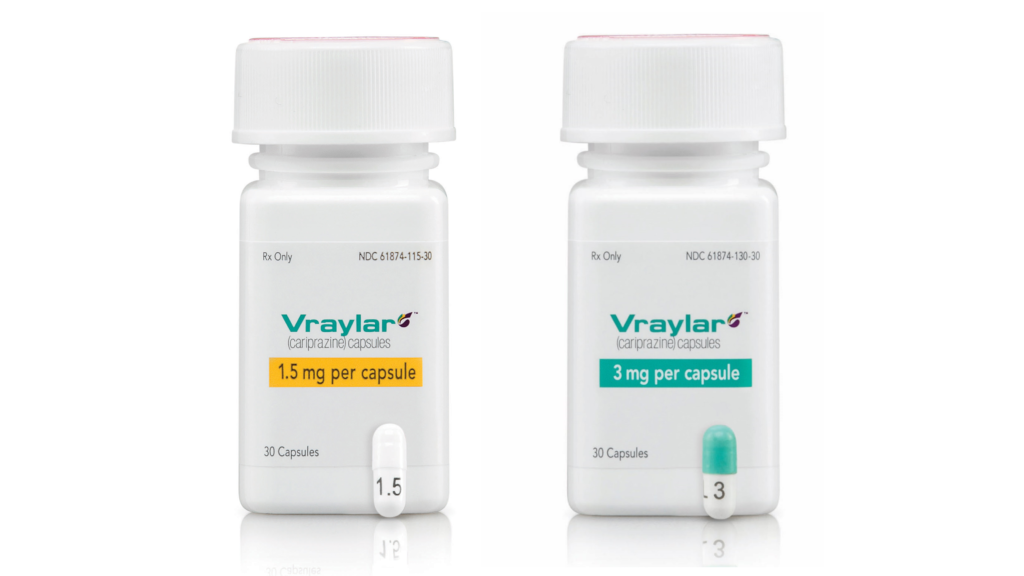Major depressive disorder (MDD) is one of the most common psychiatric disorders in the US. Approximately one in five adults will experience MDD in their lifetime. MDD is characterized by numerous symptoms such as persistent feelings of sadness, hopelessness, irritability and frustration over small matters, sleep disturbances, altered appetite, slowed speech and thinking, and loss of interest in things that would normally bring the individual joy. Depression is complex and cannot be “snapped out” of, and typically requires medication and psychotherapeutic intervention, or a combination of both.
While taking antidepressant medications, symptoms of depression can persist in many individuals, as observed in a large US study of adults with MDD. If this occurs, often a second medication (an adjunctive treatment) added to the treatment regimen may help reduce symptoms.
An existing medication, Vraylar (cariprazine), developed for the treatment of adults with depressive, acute manic, and mixed episodes associated with bipolar I disorder and schizophrenia, now has a fourth indication. On December 16, 2022, AbbVie announced in a press release that the US Food and Drug Administration (FDA) approved Vraylar as an adjunctive therapy to antidepressants for the treatment of MDD in adults. This approval positions Vraylar as the first and only dopamine and serotonin partial agonist for the most common forms of depression.
“Many living with major depressive disorder find that their ongoing antidepressant therapy doesn’t offer meaningful relief from the symptoms they experience every day,” stated Thomas Hudson, MD and senior vice president of research and development, and chief scientific officer at AbbVie. The approval of Vraylar provides a new treatment option addressing an unmet need amongst patients living with complex psychiatric conditions.
XTALKS WEBINAR: Longitudinal Patient Data — Addressing Common Questions & Unlocking the Value of Real-World Data
Live and On-Demand: Tuesday, February 7, 2023, at 12pm JST/Japan (8:30am IST/India)
Register for this free webinar to learn about the value of real-world data as a critical business tool to guide brand strategy and find the right patients for best outcomes.
Clinical Trials Show the Efficacy and Tolerability of Vraylar
Vraylar is an orally administered, once-daily atypical antipsychotic. The mechanism of action of the medication is unknown, but its efficacy is due to a combination of partial agonist activity at central dopamine D2 and serotonin 5-HT1A receptors and antagonist activity at serotonin 5-HT2A receptors.
The FDA approval of Vraylar is supported by data from two large, clinical studies that demonstrate the efficacy and tolerability of the medication. One of the studies, the Phase III study, involved 751 participants with inadequate response to antidepressant therapy (ADT) from the US and across Europe. The individuals were randomized into three treatments groups (1:1:1) — one group received cariprazine 1.5 mg/day + ADT, the second received cariprazine 3.0 mg/day + ADT, and the third received placebo + ADT. By the end of the study, there was a clinically and statistically significant improvement from baseline to week 6 in the Montgomery-Asberg Depression Ratings Scale (MADRS) for patients treated with 1.5 mg/day cariprazine + ADT compared to those treated with placebo + ADT.
In the second study, the Phase II study, 808 participants from across the US and Europe were randomized (1:1:1) into the following groups: cariprazine 1-2 mg/day + ADT, cariprazine 2-4.5 mg/day + ADT, or placebo + ADT. Subjects also showed clinically and statistically significant change from baseline to week 8 in their MADRS total score in the 2-4.5 mg/day treatment group, compared to placebo + ADT.
Vraylar was generally well tolerated in both studies. Typically, the starting dosage is 1.5 mg/day, but the dosage can be increased to a maximum of 3 mg/day on day 15 of a treatment regimen depending on clinical response and tolerability. Common adverse events observed in these two studies were akathisia (psychomotor restlessness), nausea, insomnia (in the six-week fixed dose study), fatigue, increased appetite and dizziness.
An Effective but Expensive Treatment Option
“Patients with inadequate response to standard antidepressant medication are often frustrated by the experience of trying multiple medicines and still suffering from unresolved symptoms. Instead of starting over with another standard antidepressant, Vraylar works with an existing treatment and can help build on the progress already made,” stated Gary Sachs, MD, associate clinical professor of psychiatry at Massachusetts General Hospital, and lead Phase III clinical trial investigator.
For adults with MDD, Vraylar is an effective and well tolerated adjunctive treatment option — over 8,000 patients worldwide have been treated with Vraylar in more than 20 clinical trials for various psychiatric disorders.
However, the cost of both prescription medications and psychotherapy can have very high treatment costs, which is a barrier to treatment for many individuals. A monthly supply of Vraylar without insurance can cost around $1312, which can price out many people especially if they are already paying for their primary ADT. Research into more cost-effective models of mental health care is necessary for accessible treatment.












Join or login to leave a comment
JOIN LOGIN